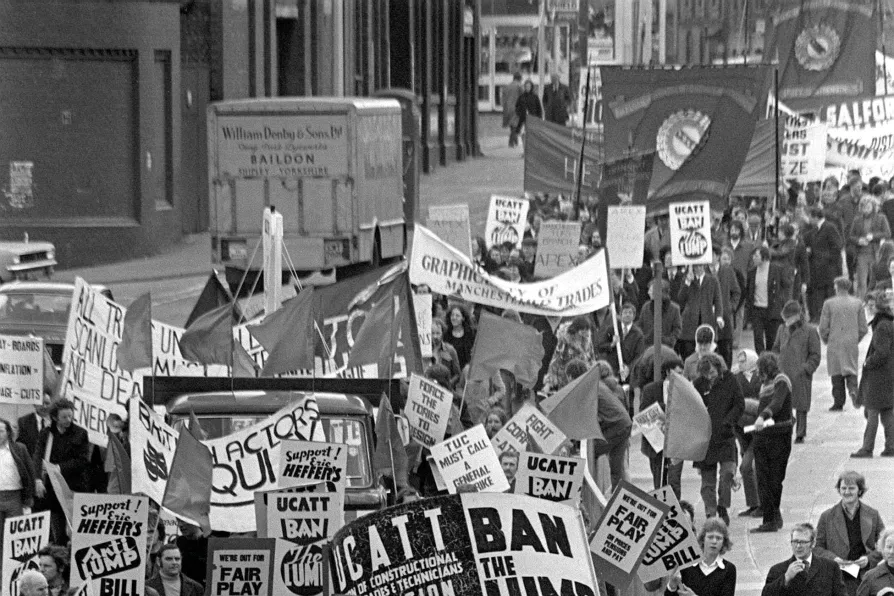John Wojcik pays tribute to a black US activist who spent six decades at the forefront of struggles for voting rights, economic justice and peace – reshaping US politics and inspiring movements worldwide
KEITH FLETT revisits the 1978 origins of Britain’s May Day bank holiday — from Michael Foot’s triumph to Thatcher’s reluctant acceptance — as Starmer’s government dodges calls to expand our working-class celebrations

 STILL MARCHING: A May Day demo makes its way through London, 1973
STILL MARCHING: A May Day demo makes its way through London, 1973
THE May Day Bank Holiday on May 5 looks set fair weatherwise, quite unusual for British bank holidays!
The current structure of public holidays goes back to the Bank Holidays Act of 1871, which recognised the principle of a very small amount of paid time off for the new industrial workforce, and of course, bank employees.
The framework has been tweaked since then to add New Year’s Day and differs in Scotland and Northern Ireland.
Another recent addition is the May Day bank holiday. 2025 is the 47th anniversary of its introduction in 1978 by the Callaghan Labour government. The minister responsible was Michael Foot.
The Tories didn’t much like it then, and many still don’t. Calls for its abolition and replacement by Trafalgar Day later in the year, or very probably a Thatcher Day, are heard from time to time.
The TUC’s view remains that Britain has the fewest public holidays in Europe.
May Day has been a traditional day of celebration, both of spring and of labour, and it is marked in one or other and sometimes both contexts around the world.
The introduction of the official holiday in 1978 did not come without some issues.
Firstly, a labour movement tradition has been not to work on May Day, or at least the afternoon of May Day, so people could actually walk out of work, even if this meant taking unofficial strike action.
The traditional London May Day march is still held on the day itself, and prior to the 1978 strike action, in some years, it was quite widespread.
The appearance of the official holiday can be seen as a way of trying to stop such — to those in authority — unfortunate occurrences.
At the same time, the complaint of many in the labour movement was that the bank holiday was only on May Day itself if it coincided with a Monday. Otherwise, it was on the next available Monday.
It is interesting to look back on the views of that May Day 47 years ago.
Fortunately, we can do this via a House of Lords debate on the holiday that took place on May 9 1978.
The debate was led off by Viscount Davidson, who asked the question whether the government thought having a May Day bank holiday was “wise” and whether they planned to continue with it.
The Tory peer claimed that the idea of having a public holiday on May Day was a matter of “political ideology.”
Lord Wallace for Labour pointed out that the Christian church had for centuries celebrated May 1 as the day of St Joseph the Worker, so the decision to have a British public holiday was clearly a “very respectable” one.
He went on to point out that the only bad thing about the 1978 May Day holiday had been that it rained, but even the then Lib-Lab pact could not control the elements. In response, Lord Alport demanded that if the government planned to persist with a May Day holiday, they must act to ensure that the weather was better.
It might be thought that the Thatcher government, after 1979, would have abolished the May Day holiday. Checking the Thatcher archive, however, one finds that on Monday May 4 1981, Mrs T enjoyed lunch with Denis, Mark and Carol, happy as others to have a day off.
Keir Starmer, with his typical regard for labour movement traditions, has declined calls for an extra holiday to mark the 80th anniversary of VE Day and said that instead, celebrations can take place on May 5. Of course, 80 years ago, this was the time that heralded in the 1945 Attlee Labour government, but I doubt Starmer has that in mind either.
Keith Flett is a socialist historian. Follow him on X @kmflett.

Research shows Farage mainly gets rebel voters from the Tory base and Labour loses voters to the Greens and Lib Dems — but this doesn’t mean the danger from the right isn’t real, explains historian KEITH FLETT

KEITH FLETT traces how the ‘world’s most successful political party’ has imploded since Thatcher’s fall, from nine leaders in 30 years to losing all 16 English councils, with Reform UK symbolically capturing Peel’s birthplace, Tamworth — but the beast is not dead yet











